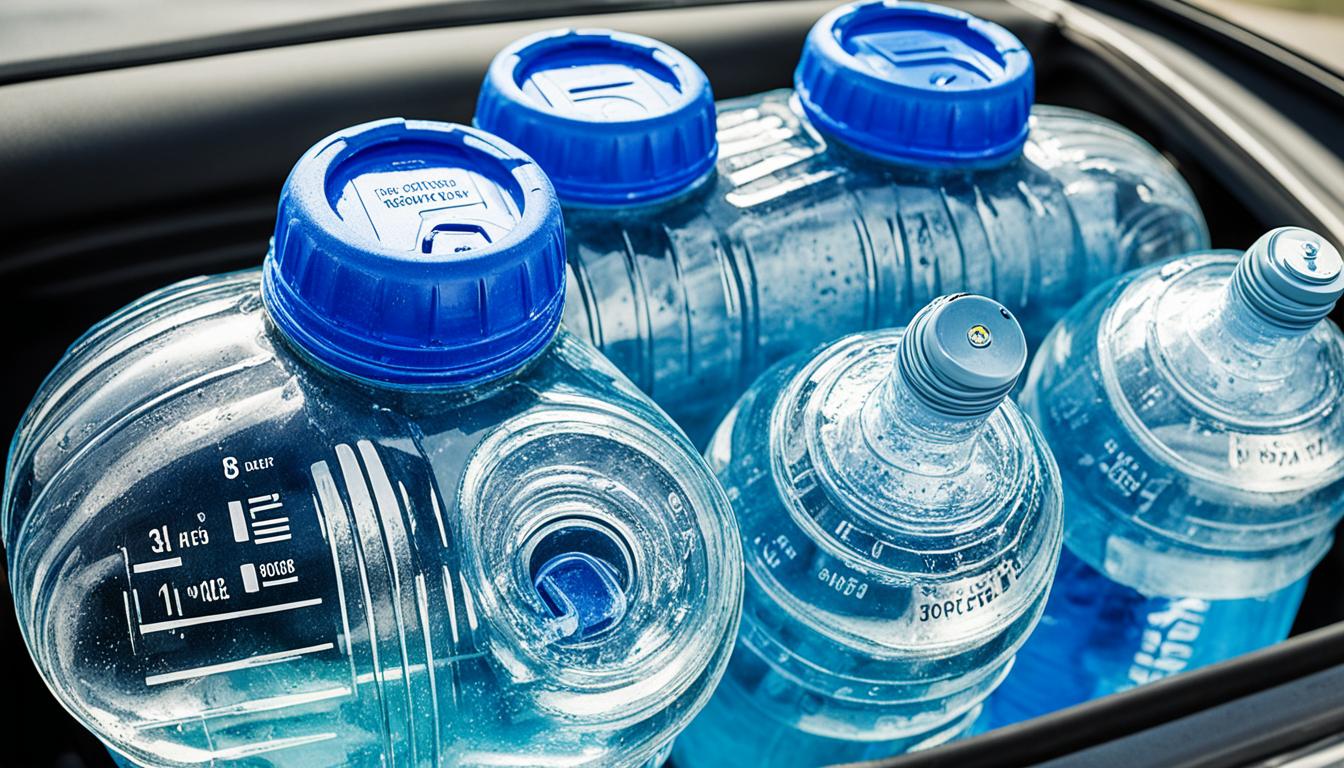When you leave unopened water bottles in a hot car, you face a few risks. Heat might not put chemicals into the water, but it creates a perfect place for bacteria to grow. If you don’t finish your water and leave it in a warm car, bacteria can grow fast. This could lead to health problems. It’s important to know how heat affects bottled water and to use good methods to keep water safe.
Key Takeaways:
- Leaving unopened water bottles in a hot car can create an environment for bacteria growth.
- Bacteria levels can increase rapidly, leading to potential health issues.
- Heat can impact the chemical composition of bottled water, although within safety limits.
- Plastic water bottles can potentially leach chemicals when exposed to heat.
- Prioritizing best practices for storing water bottles in a hot car can help prevent bacterial contamination and preserve water quality.
Can Heat Impact Your Bottled Water?
Heat can indeed affect bottled water. Studies show that heat can make chemicals leach into the water. But these are usually at safe levels. Yet, leaving water in a hot car can cause bacteria to grow. This can lead to contaminated water. It’s crucial to know the risks from chemicals and bacteria when water gets hot.
A study by the National Association for Bottled Water Quality (NABWQ) has findings. Heat can make chemicals like phthalates and bisphenol A (BPA) seep from the bottle into the water. These chemicals are in many plastic bottles. Though their health effects are debated, they usually stay within safe limits, says the FDA.
“Although chemicals in plastic bottles can worry us, they’re often at safe levels. We’re still studying the health risks of these low amounts.”
Chemical leaching is worrying, but bacteria is the bigger problem with heat. Bacteria love warm, unfinished bottles of water. This can make harmful germs grow.
“Bacterial contamination can be serious, causing stomach problems, nausea, vomiting, and diarrhea.”
Research has found bacteria, like coliform and E. coli, in water left in hot cars. These can be harmful if drunk. The risk is higher in unfinished bottles. So, keeping opened bottles safe in the heat is key.
To avoid bacterial danger and keep water safe, follow these steps:
- Keep water in cool, dark places, not near heat like the trunk.
- Use insulated bottles to keep water cool and slow bacteria growth.
- Wash bottles with hot soapy water to kill germs.
- Drink water quickly to lessen bacteria risk.
With these tips, you can reduce the risk from heat and bottled water. This way, your drinking water stays clean and safe, even in hot cars.
Understanding the Potential Chemical Contamination
Plastic water bottles are made from polyethylene terephthalate (PET) plastic. They can leach chemicals into water when exposed to heat. Research shows that chemicals from plastic can get into the water over time. Still, these levels are often within the safety limits set by the FDA.
Health risks from these chemicals at low levels are still being studied. It’s key to consider possible long-term effects. Heat makes the chemicals in plastic bottles break down. This happens slowly and depends on how long and how hot they get.
Safety Regulations and Chemical Contamination
The FDA sets rules to ensure chemicals from plastic bottles don’t harm us. These rules keep the level of harmful chemicals low. Following these rules means bottled water stays safe and good quality.
“While there are potential risks associated with chemical leaching into water from plastic bottles, it is important to remember that these levels are usually within safety regulations.”
But remember, if plastic bottles get too hot for too long, more chemicals might get into the water. It’s smart to avoid this to keep bottled water safe.
Minimizing Risks and Ensuring Safety
To lower the risk of chemical contamination, experts suggest:
- Keep water bottles cool and out of the sun to lessen heat and chemical breakdown.
- Don’t leave water bottles in hot cars for too long, as it speeds up chemical leaching.
- Think about using glass or stainless steel bottles. They’re less prone to leaching chemicals because of their materials.
- Toss water bottles that got too hot or are past their expiry date to stick to safety standards.
By following these tips, we can reduce the chance of chemicals getting into bottled water and ensure it’s safe.
Bacterial Contamination: The Real Concern
Chemicals in hot water bottles aren’t the big worry. The real problem is bacterial contamination. Heat makes it easy for bacteria to grow in water bottles that aren’t finished. Studies have shown this can lead to nasty bacteria like coliform and E. coli.
These bacteria are often found in feces and soil. They can seriously contaminate water and make us sick, causing stomach problems and other health issues.
To avoid bacterial contamination, we must ensure water meets safety standards. Storing and handling water bottles properly helps reduce risks in hot places. By adhering to safety rules for hot water bottles, our drinking water stays safe.
“Bacteria growth can occur rapidly in hot water bottles, creating a potential risk of contamination. It is important to prioritize the prevention of bacterial growth and follow safety guidelines to ensure the safety and quality of the water we consume.”
To minimize bacterial risks, follow these steps:
- Always store water bottles in a cool, shaded area away from direct heat sources.
- Choose bacteria growth-resistant materials for water bottles, such as glass or stainless steel.
- Regularly clean water bottles with hot soapy water to remove any potential bacteria buildup.
- Drink the water within two hours of opening the bottle to prevent bacterial growth.
Adopting these habits helps keep our water safe. It cuts the risk of bacterial contamination and boosts our health.
| Types of Bacteria Found in Hot Water Bottles | Consequences of Bacterial Contamination |
|---|---|
| Total coliform | Gastrointestinal issues, such as nausea, diarrhea, and vomiting |
| E. coli | Potential for severe gastrointestinal infections |
Keeping water free from harmful bacteria is key to our health. Knowing about the dangers in hot water bottles helps us prevent contamination.
Finally, we will look at tests for bacteria in hot car water bottles. We’ll see how unfinished bottles affect water quality.
Evaluating the Results: Bacteria Levels in Hot Car Water Bottles
Thornton Laboratories carried out tests to find bacteria in water bottles left in a hot car. The tests showed us the dangers of not finishing water bottles in the heat.
Testing Bacteria Levels:
A water bottle left open in a hot car for three days was tested. It had total coliform, showing bacteria was there. But, a sealed bottle in the same conditions was bacteria-free.
This study shows unfinished water bottles can have more bacteria when hot. Having E. coli or total coliform means the water is not safe. It’s a health risk that we need to avoid by being careful.
The Impact of Unfinished Bottles in Hot Cars:
Leaving water bottles open in hot cars is bad. The warmth helps harmful germs to grow, which can make us sick.
To keep water safe, we must store bottles properly. This helps meet the safety standards for drinking water.
Table: Bacteria Levels in Hot Car Water Bottles
| Bottle Type | Bacteria Present |
|---|---|
| Unfinished Bottle | Total coliform |
| Unopened Bottle | No coliform or E. coli |
It’s very important to follow rules to keep our drinking water safe. By preventing bacteria and sticking to guidelines, we ensure our water is clean and healthy.
The Risks and Health Effects of Drinking Hot Car Water
Drinking from a water bottle left in a hot car might seem safe at first. But this habit can carry risks. Open bottles especially can turn into breeding grounds for bacteria.
This can lead to stomach problems, nausea, and even vomiting. Symptoms like fevers, feeling tired, and cramps can also happen. It’s especially risky for young kids, the elderly, and anyone with a weak immune system.
Knowing the dangers of bad water is key. It’s important to stay safe and drink wisely.
Bad water can cause stomach pain, diarrhea, and throwing up. You might also feel very tired, get a fever, or have muscle pain.
Staying safe means being smart about where you keep your water. Here are some tips to stay safe:
- Never leave opened water bottles in a hot car too long.
- Throw away water you haven’t finished and get a fresh bottle.
- Keep bottles in cool, shaded spots, not in direct sunlight or heat.
- Use bottles made from safer materials like BPA-free plastic, glass, or steel.
- Wash water bottles well with hot, soapy water to keep them clean.
- Try to drink water within two hours after you open the bottle.
By following these steps, you can stay safe from the risks of hot car water. This way, you’ll always have safe water to drink.
The Potential Dangers of BPA Exposure
Bisphenol A (BPA) is a chemical found in certain plastics, like plastic water bottles. It has raised health concerns over time. Studies show BPA might cause health problems such as infertility, thyroid issues, cancer, and behavior changes in kids.
The FDA says small amounts of BPA in food packaging are safe. The BPA levels from plastic bottles usually stay within safe limits.
Still, being cautious about BPA is wise, especially for those easily affected. Choosing BPA-free bottles or using glass or stainless steel can ease worries about BPA.
BPA’s potential risks are still being studied. Keeping up with new information helps people choose safer packaging. This way, they reduce their BPA exposure.
Best Practices for Storing Water Bottles in a Hot Car
It’s vital to keep water bottles safe in a hot car. You must take steps to avoid bacterial growth and chemicals getting into your water. Let’s look at how you can keep your water clean and safe to drink.
1. Choose the Right Storage Location
Avoid leaving water bottles where the sun can hit them directly. It’s smarter to put them in the trunk or somewhere shaded. This keeps the temperature down and stops your water from getting too hot.
2. Use BPA-Free Alternatives or Glass and Stainless Steel Bottles
Choose bottles that won’t give off harmful chemicals. Options include BPA-free plastic, glass, or stainless steel. These are safer when they heat up.
3. Insulated Bottles for Temperature Control
Insulated bottles can keep your water cooler for longer in the heat. They’re good at keeping the water’s temperature steady. This means less chance for bacteria to grow.
4. Regular Cleaning and Maintenance
Make sure to wash your bottles with hot, soapy water often. This cleans away bacteria. Also, think about getting new bottles now and then to keep things extra clean.
5. Drink Within Two Hours of Opening
Try to drink opened water bottles within two hours. If water sits open too long, especially in the heat, bacteria can multiply quickly. Drinking quickly helps you avoid those bacteria.
Keep these tips in mind for safe water storage in your car. Doing so helps you drink without worrying about bacteria or chemicals. It’s all about keeping your water safe and fresh.
Conclusion
Leaving water bottles in a hot car can cause potential risks. One main issue is bacterial contamination. Still, the effect of heat on water’s chemical makeup is small.
It’s smart to use BPA-free, glass, or stainless steel bottles to keep water safe. Keeping your bottles in cool, dark spots helps too. Also, wash them well with hot soapy water. Drinking the water within two hours of opening it is key.
Making sure your water is safe, especially in hot cars, is crucial. Simple steps can protect your health. Always remember, taking a little care with your water can make a big difference for your health.





